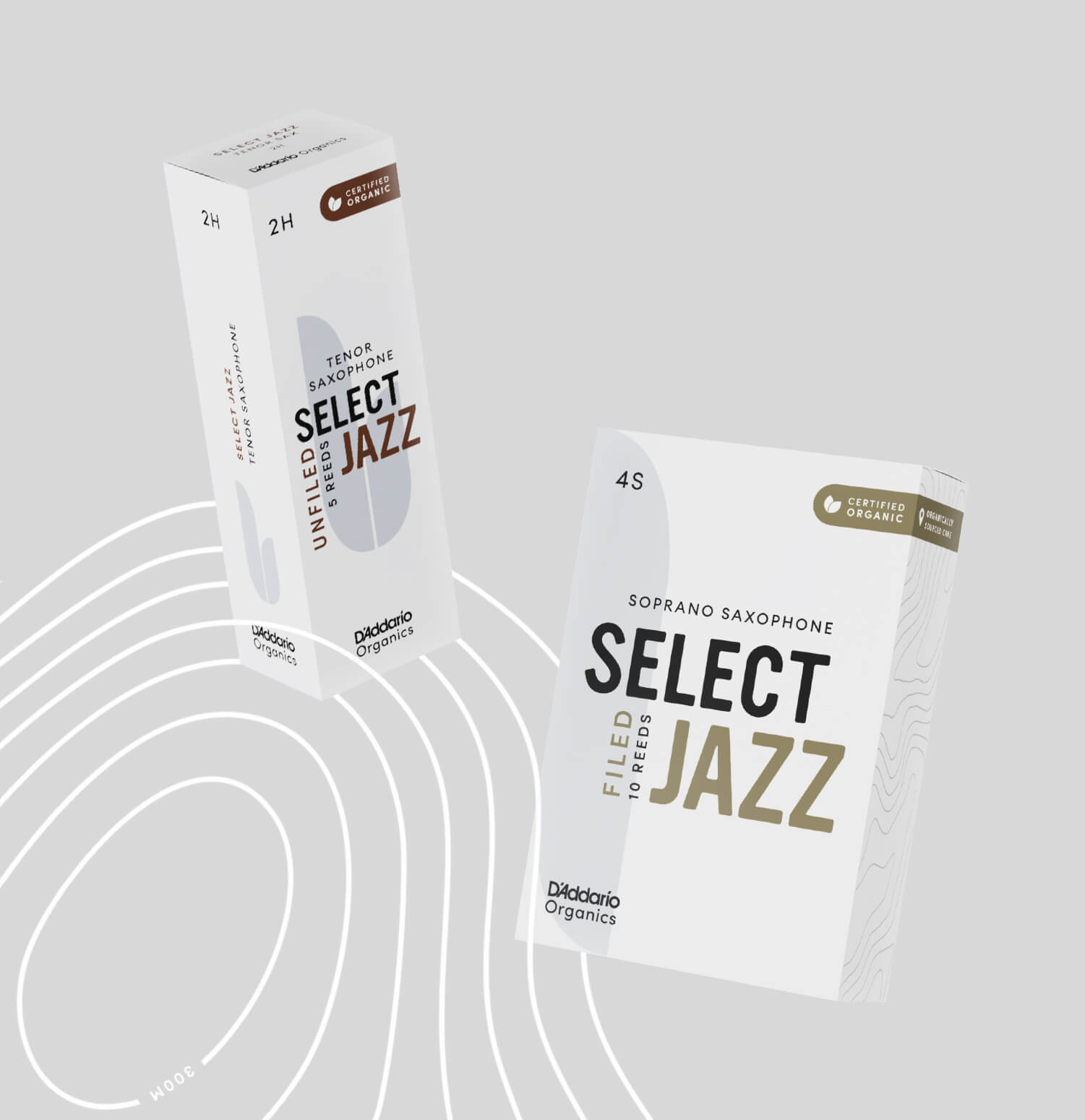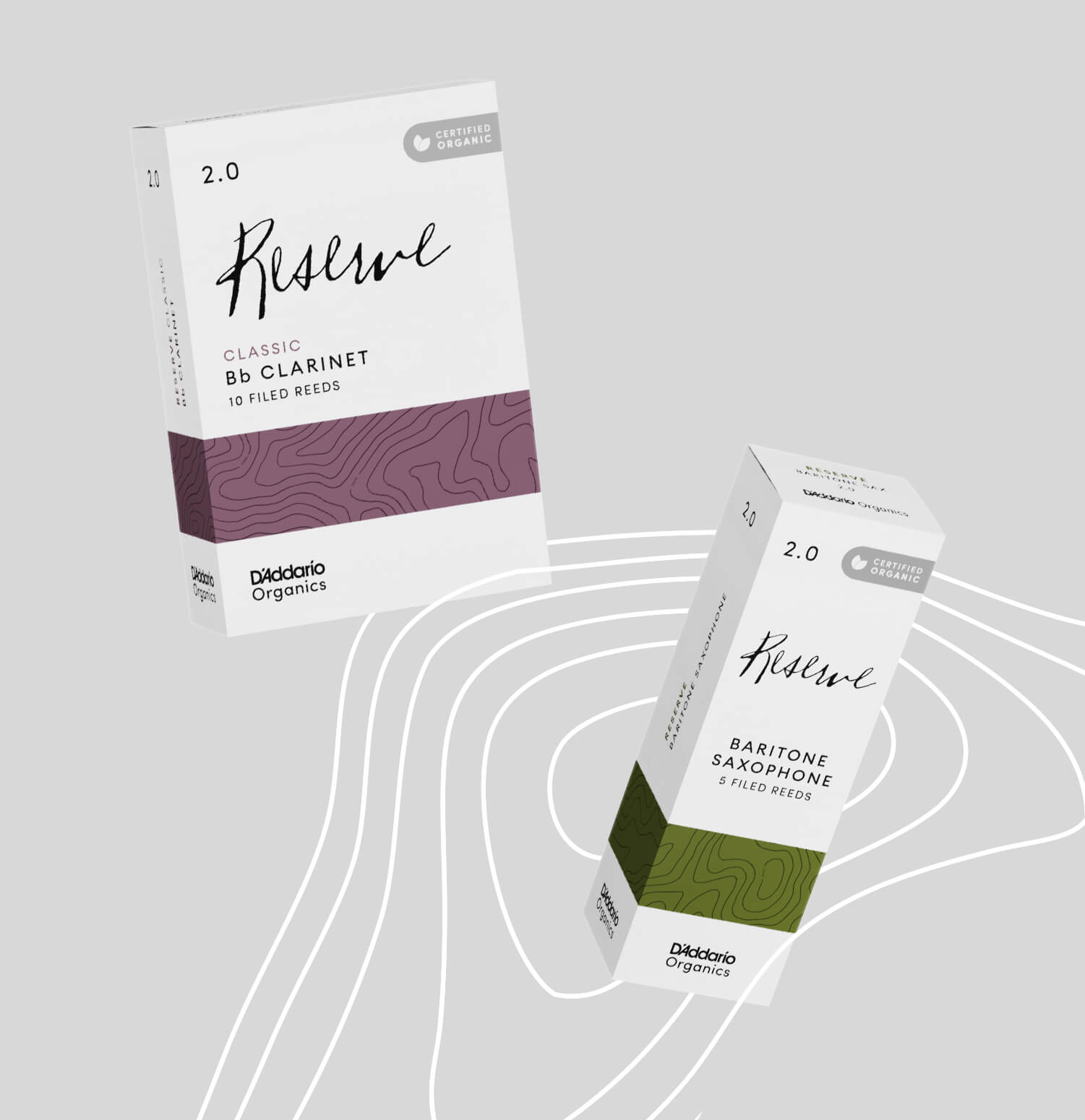
Our fully-organic process lends chemical-free peace-of-mind to the same superior projection, clarity, and vibrancy Select Jazz is renowned for.
BUY NOWOur exact same next-gen digital vamping technology, depth of tone, and ease of response— now made organically so you can focus on your sound.
buy now
These reeds represent our belief in a new way of doing things, one that's better for players and the earth they play on. A new standard for the entire industry. A new normal. A new natural.
The New Respect
Our Certified Organic reeds are protected with brand-new paper reed holders, eliminating 70,000 pounds of plastic waste each year.
The New Confidence
As the first and only Certified Organic reeds available, we’re taking our standard of uncompromising quality and consistency even further. Breathe easier. Play better.
The New Tradition
We’re 100% inspired by our French roots— even our Argentinian cane started life as French rhizomes.
The New Standard
From field to machining, our reeds meet full USDA organic certification standards.
The New Commitment
Organic Reserve and Select Jazz reeds are just the first step in our journey. By 2025, 100% of our all-cane reed products will be 100% Certified Organic.
Artists

"D'Addario Select Jazz Reeds are the best reeds for my Tenor. I can always rely on them to be responsive and give me the sound I’m after when I perform."

“The consistency of a box of Evolution reeds is the absolute best. They have a profound tonal warmth and enough 'wood' to project."

"I chose Select Jazz because they provide me with exactly the sound I have in mind. The quality is always at the top and I get to focus on the music."

“Reserve Classic reeds have a well centered, rich, and round tone— a colorful palette of sounds with the stability of good, well-cut cane.”

"Select Jazz reeds give the perfect tone and vibration I need."

“I use Reserve reeds for their warm and rich sound. I feel comfortable because I know that I can trust this product in any situation anywhere in the world.”
USDA certified organic cane is grown and processed according to US federal guidelines addressing, among many factors, soil quality, pest and weed control, and use of additives. Organic producers rely on natural substances and physical, mechanical, or biologically based farming methods to the fullest extent possible. Cane can be called organic if it’s certified to have grown on soil that had no prohibited substances applied for three years prior to harvest. Although we began utilizing organic farming practices shortly after our acquisition of Rico in 2004, the certification process to become USDA Certified Organic takes a number of years to complete.
Certified organic reeds are manufactured from cane that has been grown and processed using certified organic practices. This means that the reeds that arrive to you have not been subjected to synthetic fertilizers or pesticides.
Now that our cane at D’Addario Woodwinds plantations is certified organic, we will be upgrading our packaging to reflect our USDA Certified Organic status. In addition to upgrading our packaging, we will also be migrating away from our plastic reed holders to paper reed holders to reduce the amount of plastic in our packaging. Upgrading packaging and reed holders takes careful time and attention, so we will be working to migrate our all-cane reeds to new packaging and paper reed holders in the coming years.
No – no changes have been made in the cut, design, or cane source of your favorite D’Addario reeds. We have been utilizing organic growing and handling processes for many years now; we only recently achieved our USDA Certified Organic status.
Flow-wrapping reeds is the best way of ensuring that reeds and paper reed holders are not exposed to moisture when they are in transit or awaiting purchase. Since the reeds are so protected from moisture, it is more important than ever to ensure that players allow their new reeds to acclimate to moisture before playing.
We recommend removing your reeds from the flow wrap and allowing them to acclimate to your environment before playing, ideally in an air-tight container with a Reed Vitalizer pack.
At D’Addario we believe in lowering our environmental impact and developing industry-leading standards for sustainability. We know this means a lot to woodwind players, too – one of the most common pieces of feedback we hear from our customers is the desire to see us move away from using plastic reed sleeves.
Paper reed holders were the industry standard for many decades and will protect your reed from damage. It’s important that we ensure our reeds arrive to you in perfect playing condition. In order to do so, we must place the paper reed holders in a recyclable wrapper to ensure that they are protected from drastic changes in humidity and environmental conditions during shipment and storage on shelves around the world.
We never recommend that players store their used reeds in plastic or paper reed holders to prevent warpage. We recommend using a storage option like our D’Addario Reed Case or Reed Guards to ensure your reeds dry flat and have a long lifespan.